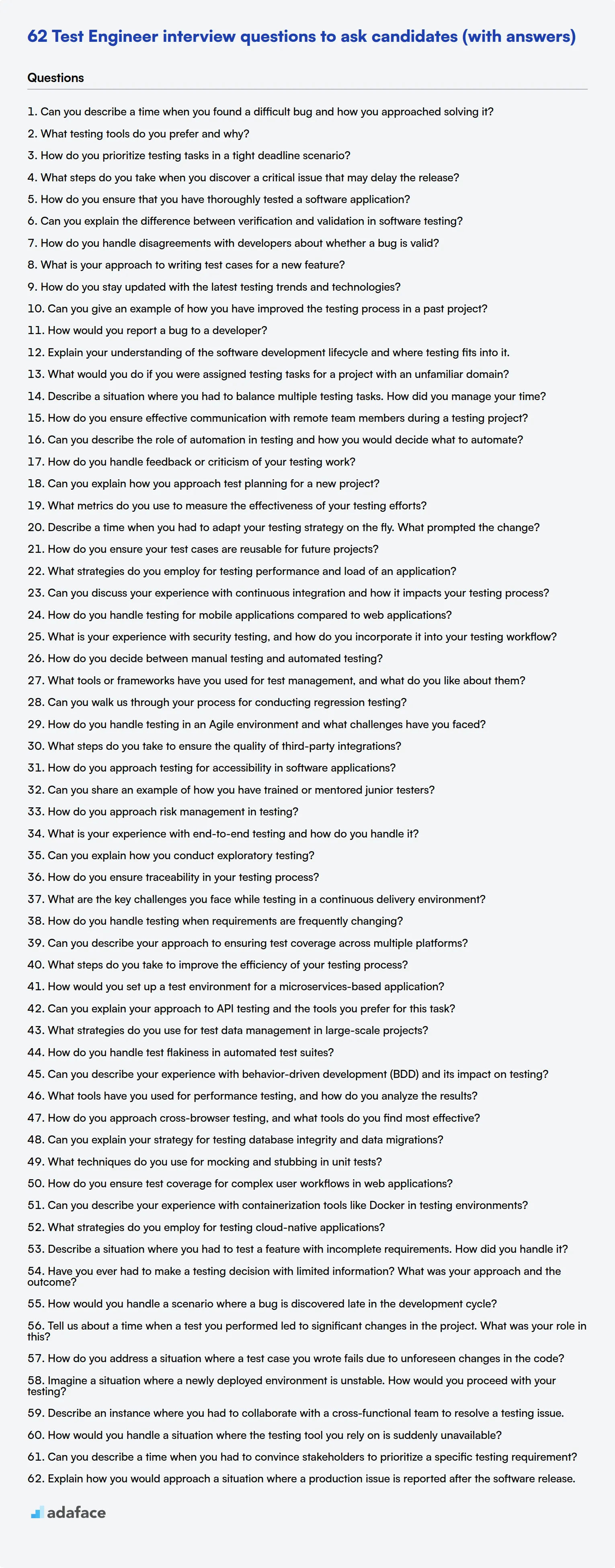Interviews can be a challenging part of the hiring process, especially when it comes to evaluating specific roles such as test engineers. Having a well-prepared list of interview questions can help identify the right candidates and avoid potential hiring mishaps, as highlighted in our insights on avoiding poor hires.
This blog post presents a comprehensive set of interview questions tailored for test engineers across various experience levels, from those just starting out to seasoned professionals. By categorizing these questions into beginner, intermediate, and advanced levels, we aim to streamline the interview process for recruiters and hiring managers.
Using these questions in conjunction with specialized assessments like our QA Engineer Test can enhance your recruitment strategy. By leveraging our structured assessments, you can confidently identify candidates with the right skills before proceeding to the interview stage.
Table of contents
10 Test Engineer interview questions to initiate the interview
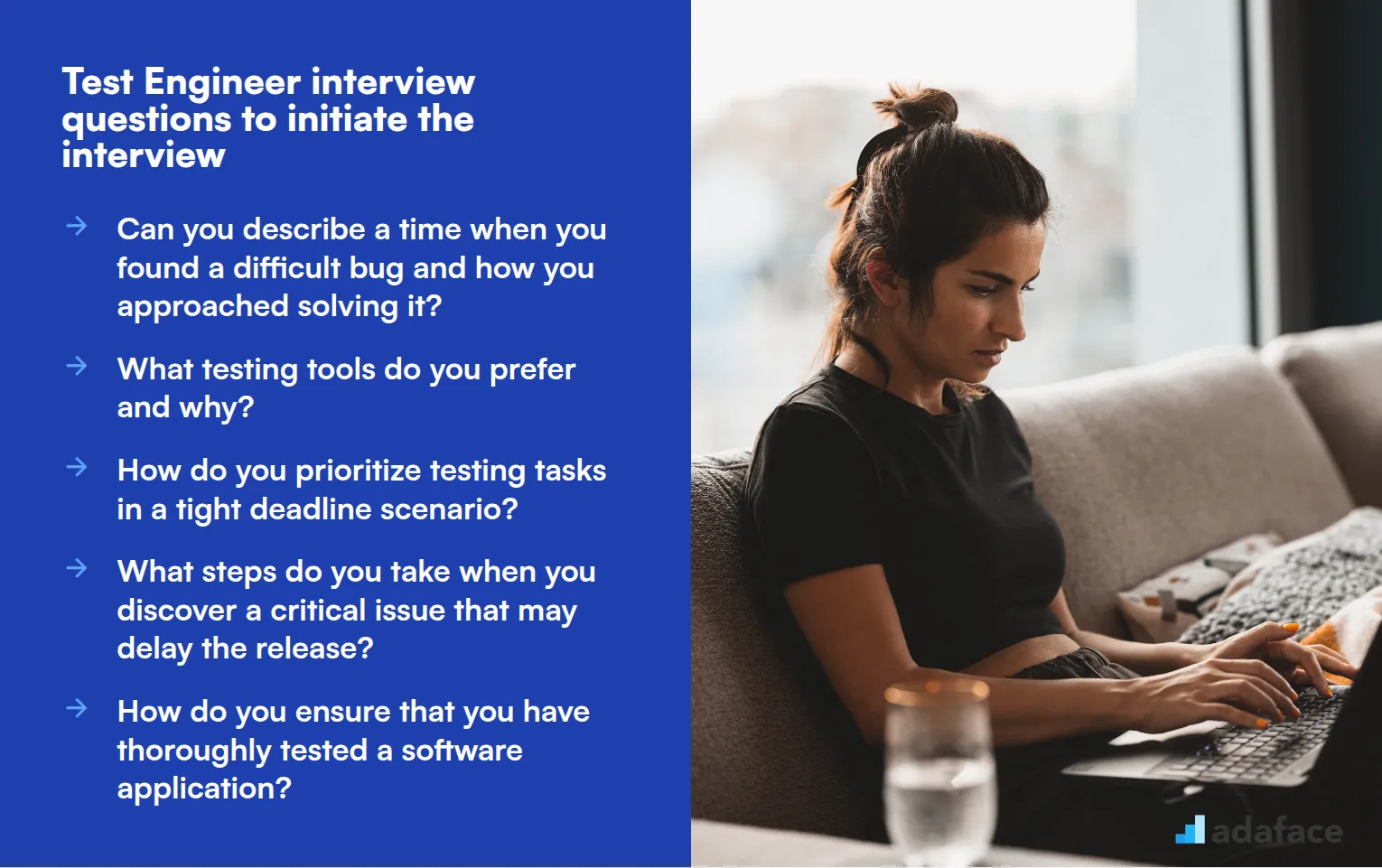
To effectively assess if a candidate fits the Test Engineer role, these curated questions can guide you through the initial stages of the interview. They are designed to reveal essential skills and thought processes necessary for the position, ensuring you get the best out of your candidates.
- Can you describe a time when you found a difficult bug and how you approached solving it?
- What testing tools do you prefer and why?
- How do you prioritize testing tasks in a tight deadline scenario?
- What steps do you take when you discover a critical issue that may delay the release?
- How do you ensure that you have thoroughly tested a software application?
- Can you explain the difference between verification and validation in software testing?
- How do you handle disagreements with developers about whether a bug is valid?
- What is your approach to writing test cases for a new feature?
- How do you stay updated with the latest testing trends and technologies?
- Can you give an example of how you have improved the testing process in a past project?
7 Test Engineer interview questions and answers to evaluate junior Test Engineers
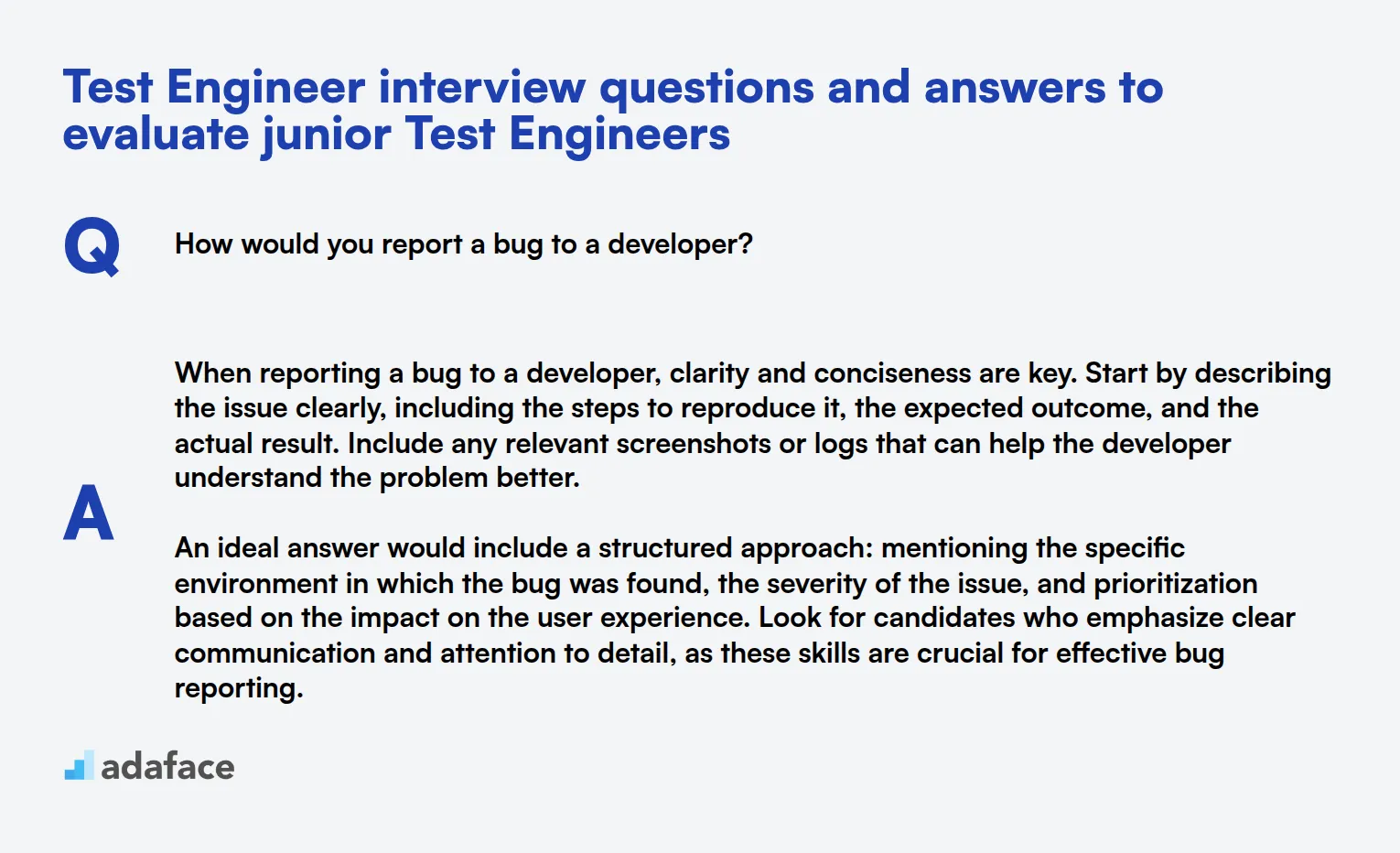
To discover the up-and-coming stars of your testing team, delve into these carefully crafted interview questions. This list is your trusty toolkit for evaluating junior Test Engineers, offering insights into their problem-solving skills and testing mindset without getting lost in technical jargon.
1. How would you report a bug to a developer?
When reporting a bug to a developer, clarity and conciseness are key. Start by describing the issue clearly, including the steps to reproduce it, the expected outcome, and the actual result. Include any relevant screenshots or logs that can help the developer understand the problem better.
An ideal answer would include a structured approach: mentioning the specific environment in which the bug was found, the severity of the issue, and prioritization based on the impact on the user experience. Look for candidates who emphasize clear communication and attention to detail, as these skills are crucial for effective bug reporting.
2. Explain your understanding of the software development lifecycle and where testing fits into it.
The software development lifecycle (SDLC) is a framework that describes the stages involved in developing software. Testing plays a crucial role in the SDLC, ensuring that the software is functional, reliable, and meets user requirements.
Candidates should articulate that testing occurs at multiple stages, including during requirements gathering (to clarify expectations), design (to ensure testability), development (through unit testing), and before release (via system and acceptance testing). Look for responses that highlight the iterative nature of testing and its importance in delivering quality software products.
3. What would you do if you were assigned testing tasks for a project with an unfamiliar domain?
Faced with an unfamiliar domain, a proactive approach involves gathering relevant domain knowledge through research and collaboration with team members. Reading documentation, exploring similar projects, and seeking insights from domain experts can provide a solid foundation.
Candidates should also mention leveraging skills required for test engineers, such as analytical thinking and adaptability, to quickly familiarize themselves with new concepts. Look for a willingness to learn and adaptability to new challenges, as these traits are valuable in a dynamic testing environment.
4. Describe a situation where you had to balance multiple testing tasks. How did you manage your time?
When juggling multiple testing tasks, prioritization is vital. Start by evaluating the importance and urgency of each task, creating a clear plan or schedule to allocate time effectively. Using tools like task lists or time management software can help keep track of progress.
Candidates should emphasize their ability to remain organized and focused under pressure, demonstrating effective time management skills. Look for examples where candidates successfully met deadlines without compromising the quality of their work.
5. How do you ensure effective communication with remote team members during a testing project?
Effective communication with remote team members requires the use of various tools and practices to maintain alignment and transparency. Regular virtual meetings, clear and concise written communication, and utilizing collaboration platforms like Slack or Microsoft Teams can foster a cohesive team environment.
Candidates should mention the importance of proactive communication, such as asking questions or providing updates, to prevent misunderstandings. Look for candidates who exhibit strong interpersonal skills and the ability to adapt communication styles to suit remote collaboration.
6. Can you describe the role of automation in testing and how you would decide what to automate?
Automation in testing is used to perform repetitive and time-consuming tasks, enabling testers to focus on more complex scenarios. When deciding what to automate, consider factors like test frequency, test stability, and the return on investment for automation efforts.
Candidates should highlight the benefits of automation, such as increased efficiency and reliability, while acknowledging that not all tests are suitable for automation. Look for candidates who understand the strategic balance between manual and automated testing.
7. How do you handle feedback or criticism of your testing work?
Feedback and criticism are vital for professional growth. A constructive approach involves viewing feedback as an opportunity to learn and improve. Actively listening to feedback, reflecting on it, and implementing changes where necessary demonstrates a growth mindset.
Candidates should express openness to feedback and a willingness to adapt their approach in response to constructive criticism. Look for those who show humility and a genuine interest in developing their skills and contributing to the team's success.
15 intermediate Test Engineer interview questions and answers to ask mid-tier Test Engineers.
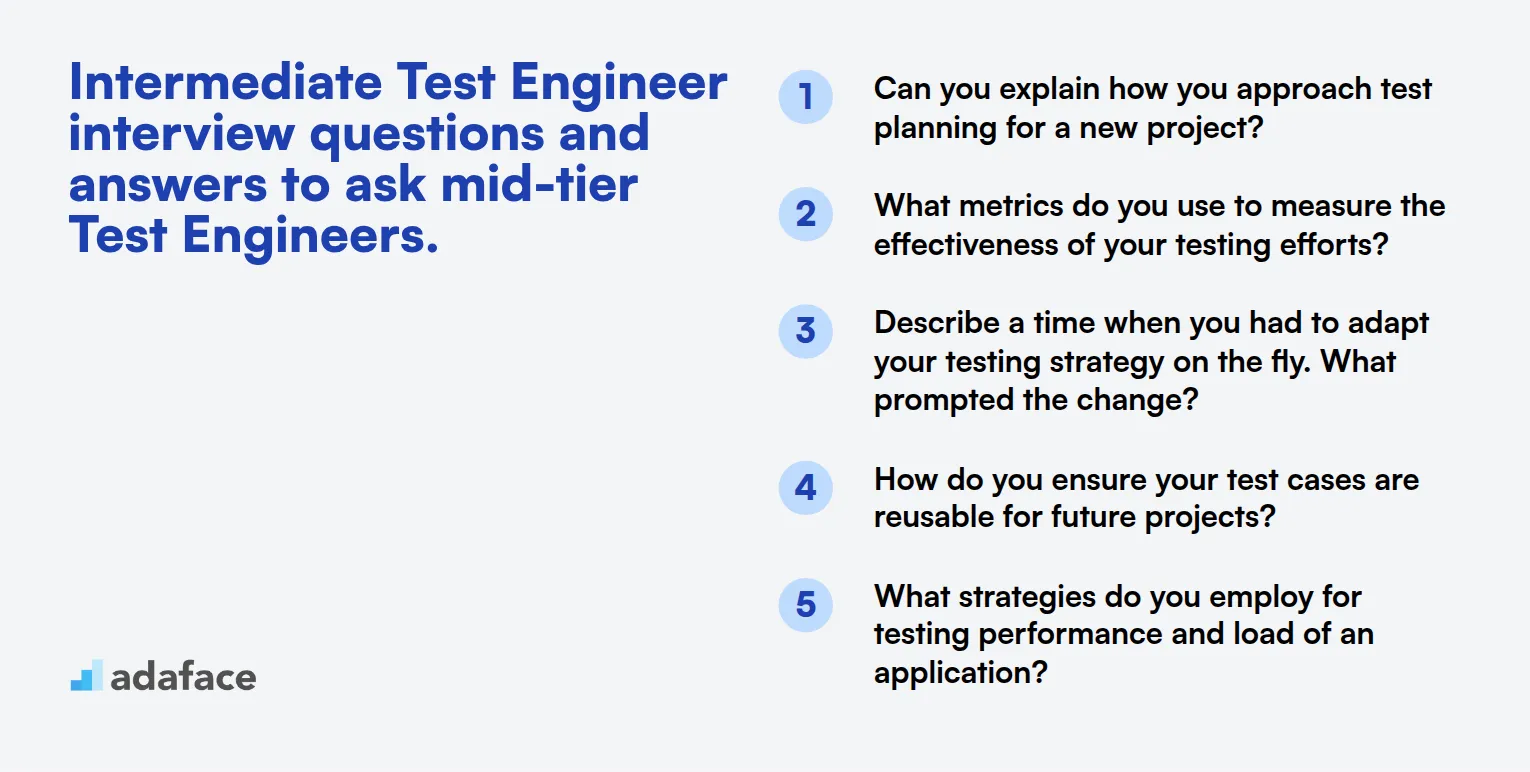
To assess the capabilities of mid-tier Test Engineers, consider using this list of interview questions. These questions aim to gauge their experience and problem-solving skills in real-world scenarios, helping you find the right fit for your team. For detailed job descriptions, check out our Test Engineer job description.
- Can you explain how you approach test planning for a new project?
- What metrics do you use to measure the effectiveness of your testing efforts?
- Describe a time when you had to adapt your testing strategy on the fly. What prompted the change?
- How do you ensure your test cases are reusable for future projects?
- What strategies do you employ for testing performance and load of an application?
- Can you discuss your experience with continuous integration and how it impacts your testing process?
- How do you handle testing for mobile applications compared to web applications?
- What is your experience with security testing, and how do you incorporate it into your testing workflow?
- How do you decide between manual testing and automated testing?
- What tools or frameworks have you used for test management, and what do you like about them?
- Can you walk us through your process for conducting regression testing?
- How do you handle testing in an Agile environment and what challenges have you faced?
- What steps do you take to ensure the quality of third-party integrations?
- How do you approach testing for accessibility in software applications?
- Can you share an example of how you have trained or mentored junior testers?
8 advanced Test Engineer interview questions and answers to evaluate senior Test Engineers
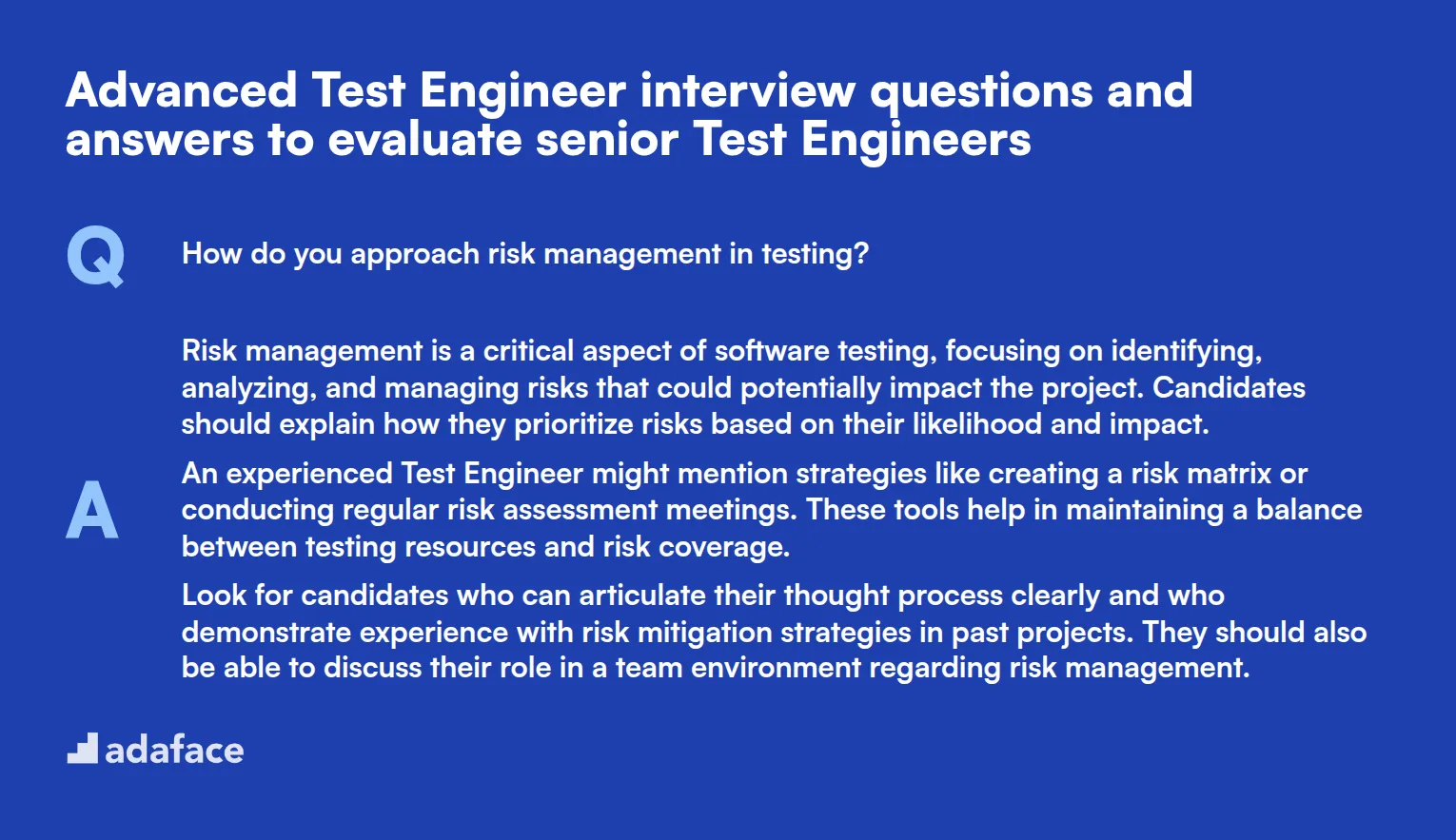
When you're looking to hire a senior Test Engineer who knows their stuff, these advanced interview questions are your secret weapon. They dig deeper than the basics to uncover candidates who can think critically and solve complex problems. Use this list when you're ready to explore the full depth of an applicant's experience and expertise.
1. How do you approach risk management in testing?
Risk management is a critical aspect of software testing, focusing on identifying, analyzing, and managing risks that could potentially impact the project. Candidates should explain how they prioritize risks based on their likelihood and impact.
An experienced Test Engineer might mention strategies like creating a risk matrix or conducting regular risk assessment meetings. These tools help in maintaining a balance between testing resources and risk coverage.
Look for candidates who can articulate their thought process clearly and who demonstrate experience with risk mitigation strategies in past projects. They should also be able to discuss their role in a team environment regarding risk management.
2. What is your experience with end-to-end testing and how do you handle it?
End-to-end testing is a comprehensive testing approach that validates the flow of an application from start to finish, ensuring that all integrated components work together as expected. Candidates should be familiar with designing and executing such tests.
A robust answer should include specific examples of end-to-end test cases they have worked on. They may discuss how they ensured coverage across various use cases and handled dependencies between different systems.
Ideal candidates will demonstrate an understanding of the complexities involved in end-to-end testing and provide examples of how they effectively coordinated with developers and stakeholders to resolve issues.
3. Can you explain how you conduct exploratory testing?
Exploratory testing is an approach that emphasizes the tester's creativity, intuition, and experience to identify defects not covered by formal test cases. It involves simultaneous learning, test design, and test execution.
Candidates may describe their process of exploring the application, noting down test ideas, and leveraging their understanding of the domain to uncover issues. They should be able to discuss how they document their findings and insights.
Look for candidates who express a keen eye for detail and an ability to think outside the box. They should also demonstrate adaptability and how they use exploratory testing to complement traditional testing methods.
4. How do you ensure traceability in your testing process?
Traceability in testing ensures that all requirements are covered by test cases, and any defects found are linked back to their source requirements. Candidates should be familiar with traceability matrices and tools that facilitate this process.
A seasoned Test Engineer might explain their approach to mapping test cases to requirements and defects, using tools like JIRA or TestRail to maintain clear documentation.
Candidates should highlight their attention to detail and organizational skills. An effective answer will include examples of how they have maintained traceability in past projects and the benefits it brought to overall project quality.
5. What are the key challenges you face while testing in a continuous delivery environment?
Testing in a continuous delivery environment involves challenges such as maintaining test stability, managing test data, and handling frequent code changes. Candidates should discuss their strategies to overcome these hurdles.
An experienced candidate might describe their use of automation to keep up with rapid deployment cycles and the importance of a robust test suite to catch regressions early.
Look for candidates who understand the balance between speed and quality, and who can provide examples of how they've adapted their testing processes to fit a continuous delivery model.
6. How do you handle testing when requirements are frequently changing?
Frequent changes in requirements necessitate a flexible and adaptive testing approach. Candidates should explain how they manage change requests and keep their test plans up-to-date.
A strong response would include strategies such as maintaining close communication with stakeholders and using agile methodologies to adapt quickly. They might also discuss the use of tools to manage changes effectively.
Candidates should demonstrate their ability to remain organized and proactive in the face of change, ensuring that quality is maintained even when requirements evolve.
7. Can you describe your approach to ensuring test coverage across multiple platforms?
Ensuring test coverage across multiple platforms requires a strategic approach to handle different operating systems, browsers, and devices. Candidates should articulate how they plan and execute tests to achieve this.
They should mention using a combination of manual and automated tests, utilizing tools like Selenium or Appium, and prioritizing key user flows across platforms.
The ideal candidate will show an understanding of the challenges involved in cross-platform testing and provide examples of how they've achieved comprehensive coverage in previous projects.
8. What steps do you take to improve the efficiency of your testing process?
Improving the efficiency of the testing process involves streamlining workflows, optimizing resources, and leveraging the right tools. Candidates should discuss their methods for achieving these improvements.
They might mention implementing automation where it adds value, refining test cases based on past experiences, and incorporating feedback loops for continuous improvement.
Candidates should demonstrate a mindset focused on efficiency and effectiveness, providing examples of successful process improvements and their impact on project timelines and quality.
12 Test Engineer questions related to tools and methodologies
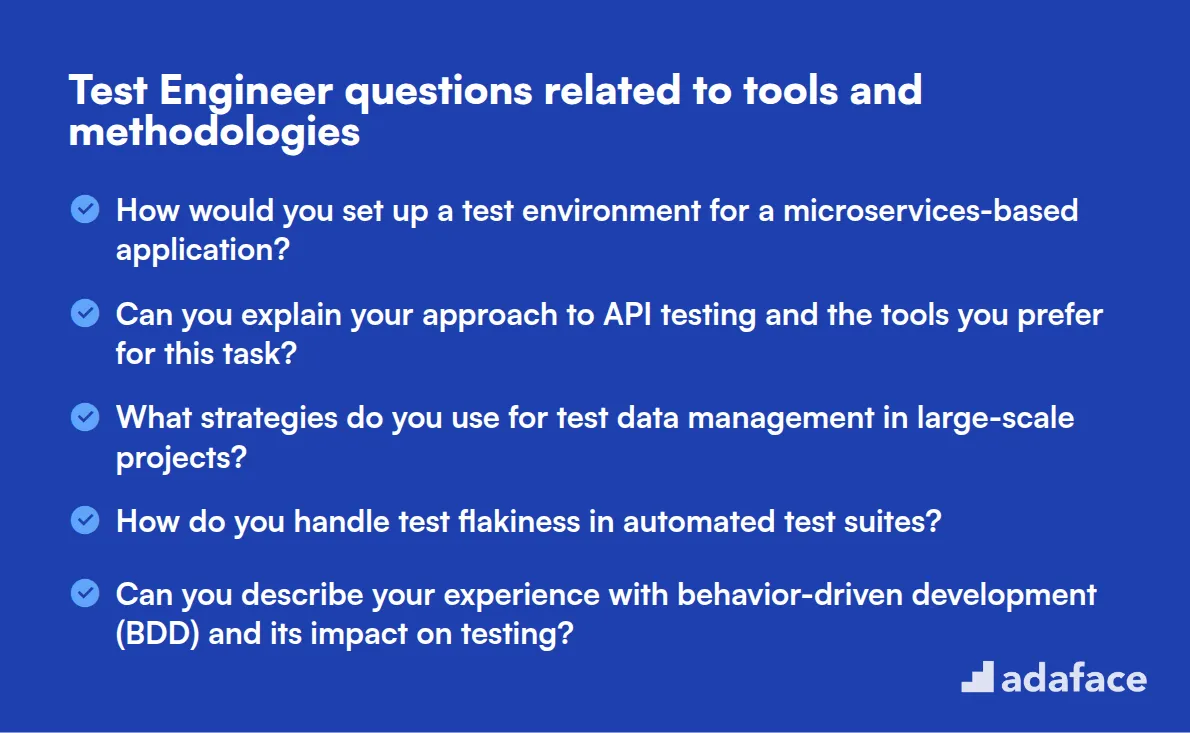
To assess a candidate's proficiency with testing tools and methodologies, consider using these questions during your interview. They are designed to reveal the applicant's practical experience and problem-solving abilities in real-world testing scenarios.
- How would you set up a test environment for a microservices-based application?
- Can you explain your approach to API testing and the tools you prefer for this task?
- What strategies do you use for test data management in large-scale projects?
- How do you handle test flakiness in automated test suites?
- Can you describe your experience with behavior-driven development (BDD) and its impact on testing?
- What tools have you used for performance testing, and how do you analyze the results?
- How do you approach cross-browser testing, and what tools do you find most effective?
- Can you explain your strategy for testing database integrity and data migrations?
- What techniques do you use for mocking and stubbing in unit tests?
- How do you ensure test coverage for complex user workflows in web applications?
- Can you describe your experience with containerization tools like Docker in testing environments?
- What strategies do you employ for testing cloud-native applications?
10 situational Test Engineer interview questions for hiring top Test Engineers
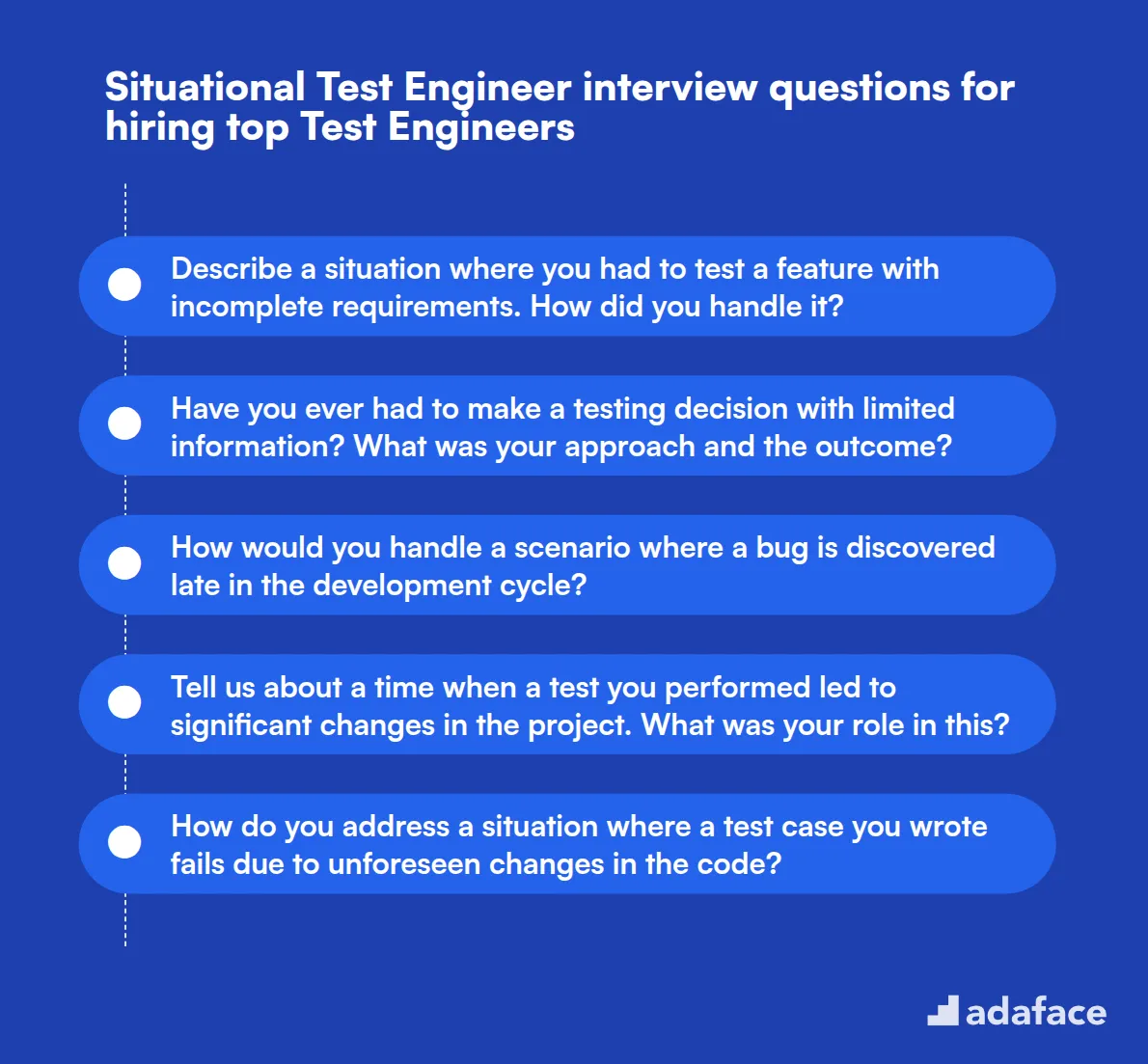
To identify top Test Engineers who can handle real-world challenges, consider using these situational interview questions. They are designed to gauge the candidate's problem-solving skills and adaptability in various testing environments. For more insights on what makes a great Test Engineer, check out this Test Engineer job description.
- Describe a situation where you had to test a feature with incomplete requirements. How did you handle it?
- Have you ever had to make a testing decision with limited information? What was your approach and the outcome?
- How would you handle a scenario where a bug is discovered late in the development cycle?
- Tell us about a time when a test you performed led to significant changes in the project. What was your role in this?
- How do you address a situation where a test case you wrote fails due to unforeseen changes in the code?
- Imagine a situation where a newly deployed environment is unstable. How would you proceed with your testing?
- Describe an instance where you had to collaborate with a cross-functional team to resolve a testing issue.
- How would you handle a situation where the testing tool you rely on is suddenly unavailable?
- Can you describe a time when you had to convince stakeholders to prioritize a specific testing requirement?
- Explain how you would approach a situation where a production issue is reported after the software release.
Which Test Engineer skills should you evaluate during the interview phase?
While a single interview might not provide a complete picture of a candidate's abilities, focusing on specific skills can significantly aid in assessing their suitability for a Test Engineer role. Core skills help you identify whether the candidate can handle the challenges posed by the position, ensuring a more successful hire.
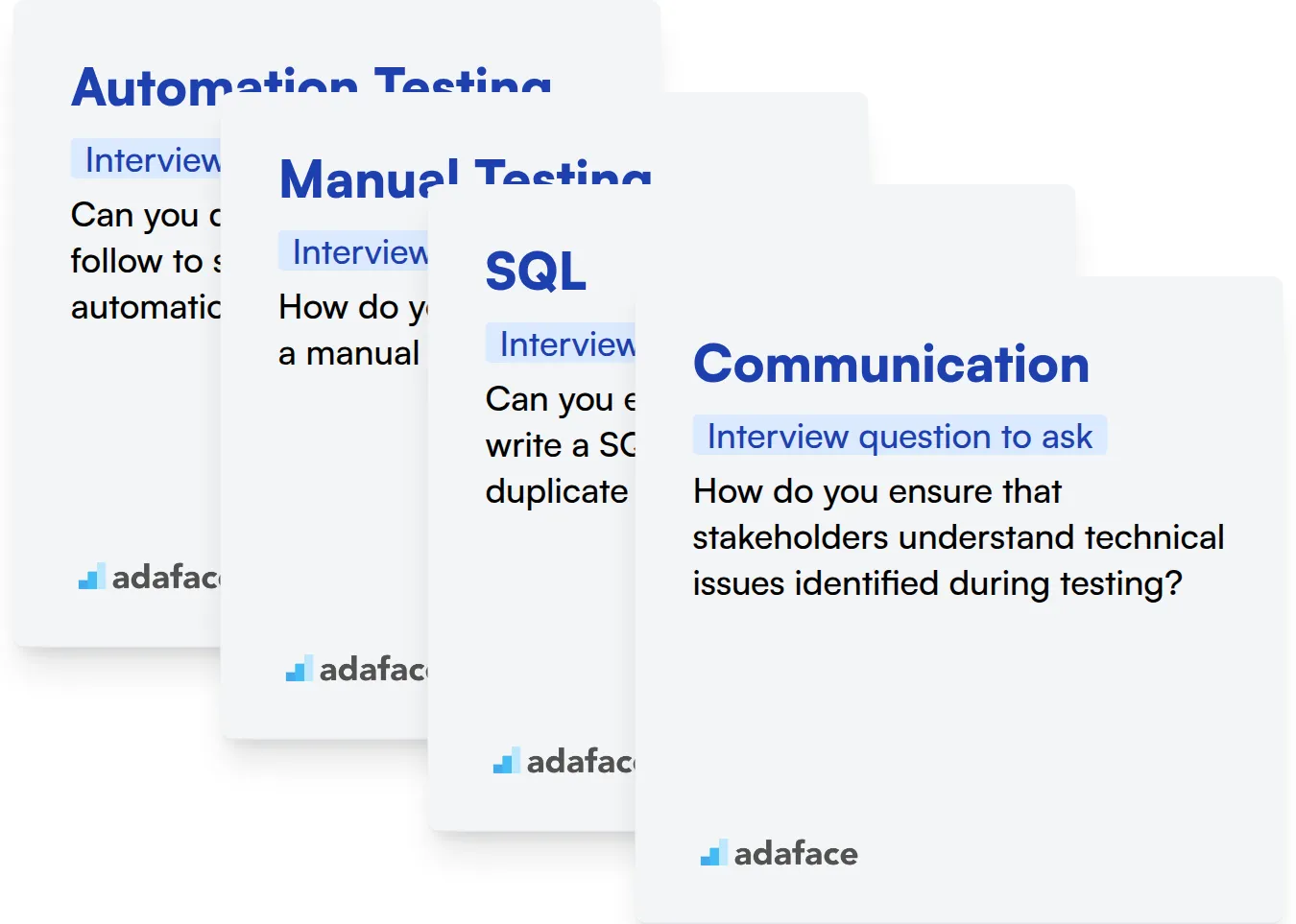
Automation Testing
Consider using an assessment test that includes relevant MCQs to filter out candidates with automation testing expertise. You can explore the Selenium online test in our library to assess this skill.
During the interview, it can be helpful to ask targeted questions specifically to judge their automation testing expertise.
Can you describe the process you follow to select a test case for automation?
Look for candidates who can articulate a structured approach to identifying suitable test cases for automation, ensuring they consider factors like test stability, repeatability, and return on investment.
Manual Testing
To assess manual testing skills, you can ask questions aimed at their understanding and application of manual testing techniques.
How do you prioritize test cases in a manual testing scenario?
Effective responses should demonstrate an ability to prioritize by risk, potential impact, and test case dependencies, showing a strategic approach to manual testing.
SQL
You can leverage our SQL online test to evaluate a candidate's ability to handle database-related testing tasks.
Consider asking specific questions about their experience with SQL queries as part of their testing process.
Can you explain how you would write a SQL query to identify duplicate entries in a table?
Candidates should exhibit proficiency in SQL, explaining their approach to crafting queries that help ensure data integrity and meet testing objectives.
Communication
Our Communication test can assist in evaluating a candidate's communication capabilities through scenario-based questions.
To gauge their communication skills, ask questions that reveal their ability to explain complex concepts clearly.
How do you ensure that stakeholders understand technical issues identified during testing?
Ideal candidates will demonstrate clarity in explanation, adapting their communication to suit both technical and non-technical stakeholders, fostering better understanding and collaboration.
Hire top talent with Test Engineer skills tests and the right interview questions
When hiring for a Test Engineer, it is important to ensure the candidates possess the necessary skills. Identifying these skills accurately will help you find the right fit for your team.
The most effective way to verify these skills is through targeted skill tests. Consider using our QA Engineer Test or Manual Testing Online Test to evaluate potential candidates.
Once you have conducted the tests, you can effectively shortlist the best applicants for interviews. This will streamline your recruitment process and help you focus on the most qualified candidates.
To get started, you can sign up on our Adaface platform or explore our test library for more assessments tailored to your needs.
QA Engineer Test
Download Test Engineer interview questions template in multiple formats
Test Engineer Interview Questions FAQs
A Test Engineer should have strong analytical skills, attention to detail, knowledge of testing methodologies, programming skills, and familiarity with testing tools and frameworks.
Use situational questions, ask about past experiences with complex bugs, and present hypothetical scenarios to evaluate their approach to problem-solving.
Look for leadership skills, strategic thinking, deep technical knowledge, experience with test automation, and the ability to mentor junior team members.
These questions help assess technical skills, problem-solving abilities, and cultural fit, allowing you to make informed decisions when selecting the best Test Engineer for your team.

40 min skill tests.
No trick questions.
Accurate shortlisting.
We make it easy for you to find the best candidates in your pipeline with a 40 min skills test.
Try for freeRelated posts
Free resources




